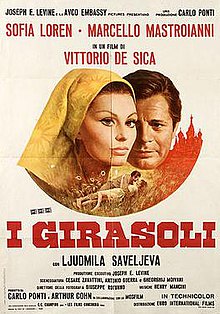
Sofia Costanza Brigida Villani Scicolone, known professionally as Sophia Loren, is an Italian actress. With a career spanning over 70 years, she was named by the American Film Institute as one of the greatest stars of classical Hollywood cinema and is one of the last surviving major stars from the era. Loren is also the only remaining living person to appear on AFI's list of the 50 greatest stars of American film history, positioned 21st.

Marcello Vincenzo Domenico Mastroianni was an Italian film actor, regarded as one of his country's most iconic male performers of the 20th century. He played leading roles for many of Italy's top directors in a career spanning 147 films between 1939 and 1996, and garnered many international honours including two BAFTA Awards, two Best Actor awards at the Venice and Cannes film festivals, two Golden Globes, and three Academy Award nominations.
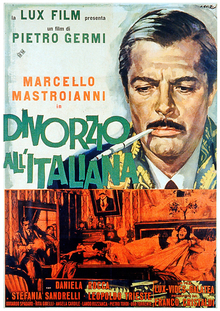
Divorce Italian Style is a 1961 Italian black comedy film directed by Pietro Germi. The screenplay is by Germi, Ennio De Concini, Alfredo Giannetti, and Agenore Incrocci, based on Giovanni Arpino's novel Un delitto d'onore. It stars Marcello Mastroianni, Daniela Rocca, Stefania Sandrelli, Lando Buzzanca, and Leopoldo Trieste.

A Special Day is a 1977 period drama film directed and co-written by Ettore Scola, produced by Carlo Ponti, and starring Sophia Loren and Marcello Mastroianni. Set in Rome in 1938, its narrative follows a housewife (Loren) and her neighbor (Mastroianni) who stay home the day Adolf Hitler visits Benito Mussolini.

Two Women is a 1960 war drama film directed by Vittorio De Sica from a screenplay he co-wrote with Cesare Zavattini, based on the 1957 novel of the same name by Alberto Moravia. The film stars Sophia Loren, Jean-Paul Belmondo, Eleonora Brown and Raf Vallone. It tells the story of a woman trying to protect her young daughter from the horrors of war. The story is fictional, but based on actual events of 1944 in Rome and rural Lazio, during the Marocchinate.
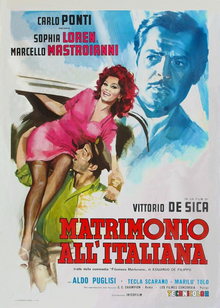
Marriage Italian Style is a 1964 romantic comedy-drama film directed by Vittorio De Sica, starring Sophia Loren and Marcello Mastroianni.
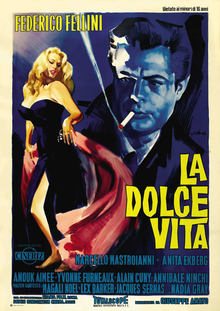
La dolce vita is a 1960 satirical comedy-drama film directed and co-written by Federico Fellini. The film stars Marcello Mastroianni as Marcello Rubini, a tabloid journalist who, over seven days and nights, journeys through the "sweet life" of Rome in a fruitless search for love and happiness. The screenplay, written by Fellini and three other screenwriters, can be divided into a prologue, seven major episodes interrupted by an intermezzo, and an epilogue, according to the most common interpretation.
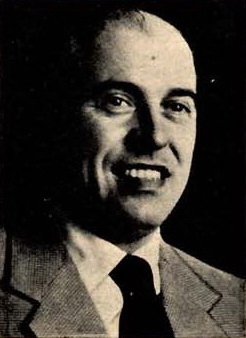
Carlo Fortunato Pietro Ponti Sr.OMRI was an Italian film producer with more than 140 productions to his credit. Along with Dino De Laurentiis, he is credited with reinvigorating and popularizing Italian cinema post-World War II, producing some of the country's most acclaimed and financially-successful films of the 1950s and 1960s.
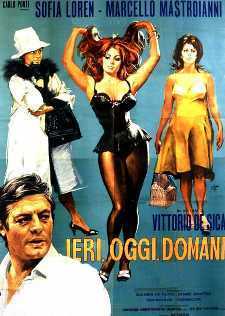
Yesterday, Today and Tomorrow is a 1963 comedy anthology film by Italian director Vittorio De Sica. It stars Sophia Loren and Marcello Mastroianni. The film consists of three short stories about couples in different parts of Italy. The film won the Academy Award for Best Foreign Language Film at the 37th Academy Awards.
Giuseppe Rotunno was an Italian cinematographer.

Commedia all'italiana, or Italian-style comedy, is an Italian film genre born in Italy in the 1950s and developed in the 1960s and 1970s. It is widely considered to have started with Mario Monicelli's Big Deal on Madonna Street in 1958, and derives its name from the title of Pietro Germi's Divorce Italian Style (1961). According to most of the critics, La Terrazza (1980) by Ettore Scola is the last work considered part of the commedia all'italiana.
The Nastro d'Argento is a film award assigned each year, since 1946, by Sindacato Nazionale dei Giornalisti Cinematografici Italiani, the association of Italian film critics.
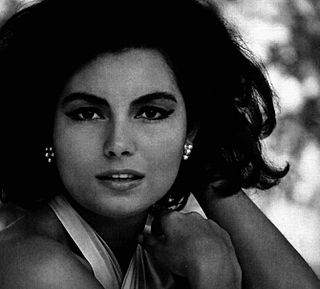
Rosanna Schiaffino was an Italian film actress. She appeared on the covers of Italian, German, French, British and American magazines.

Robbery, ... Style is a 1978 Soviet parody animated film by Yefim Gamburg. It is split into four parts: Robbery, American Style; Robbery, French Style; Robbery, Italian Style, and the last, though untitled, clearly refers to the USSR. Each segment is a parody of 1960-1970s crime films in the corresponding countries.

Love Story is a 1942 Italian drama film directed by Mario Camerini and starring Assia Noris, Piero Lulli and Carlo Campanini. It is based on the play Life Begins by Mary McDougal Axelson, previously adapted into a 1932 film of the same title and a 1939 film A Child Is Born. Along with A Pistol Shot it marked an attempt to showcase Noris as a dramatic actress, rather than the White Telephone comedies she had become known for. It was screened at the 1942 Venice Film Festival.

A Slice of Life is a 1954 Italian comedy film directed by Alessandro Blasetti and Paul Paviot.

Lucky to Be a Woman is a 1956 Italian comedy film directed by Alessandro Blasetti and starring Sophia Loren, Charles Boyer and Marcello Mastroianni.
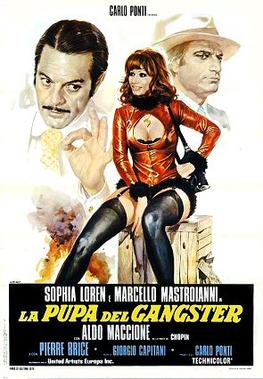
Sex Pot is a 1975 Italian comedy film directed by Giorgio Capitani. Alternative titles for the film in the English language include Poopsie & Co., Gun Moll, Get Rita, Lady of the Evening, Oopsie Poopsie and Poopsie.

Macaroni is a 1985 Italian comedy-drama film directed by Ettore Scola. The film, starring Marcello Mastroianni and Jack Lemmon, was selected as the Italian entry for the Best Foreign Language Film at the 58th Academy Awards, ahead of Federico Fellini's Ginger and Fred, but was not accepted as a nominee.

Saan Ka Man Naroroon is a 1993 Filipino romantic melodrama film directed by Carlos Siguion-Reyna and starring Richard Gomez, Dawn Zulueta, Sharmaine Arnaiz, and Charito Solis. The screenplay by Raquel Villavicencio is inspired by the 1970 Italian drama film Sunflower directed by Vittorio de Sica and starring Sophia Loren and Marcello Mastroianni.
